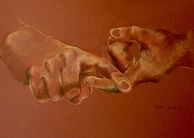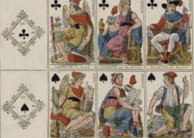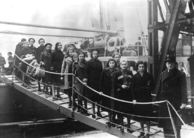Featured Article:A Theory of Vernacular Rhetoric: Reading Dante's De Vulgari Eloquentia
By
2017, Vol. 9 No. 04 | pg. 1/1
IN THIS ARTICLE
KEYWORDS
The relationships between power and rhetoric have been the subject of many recent studies, most notably from the conversation concerning “critical rhetoric” (McKerrow, 1989; Murphy, 1995; Ono & Sloop, 1992; Shugart, 2003; Zompetti, 1997). Recent discussions have also occurred regarding the nature of vernacular discourse and how it affects disempowered groups (Berkowitz, 1997; Cheshire & Stein, 1997; Delgado, 1998; Hauser, 1998; 1999; McLaughlin, 1996; Ono & Sloop, 1995). Reflecting on the contemporary nexus between power and rhetoric certainly has its value, but we would do well to note how rhetoric and power, particularly regarding the vernacular, function historically, especially if we can see import in the relationship to our current condition. A little known manuscript from the fourteenth century helps to shed insight on the historical relationship between rhetoric and power, at least during the Middle Ages, despite the fact that it seemed to attract little attention (Howell, 1969, p. 116). As such, Dante Alighieri's De Vulgari Eloquentia (On Speaking in the Vernacular) provides a useful foundation for a rhetorical theory of the vernacular that supports, if not surpasses, recent scholarly discussions of the vernacular. Vernacular discourse is the language spoken by common people; what we might call "everyday" language (Hauser, 1998, p. 83). As such, vernacular discourse is accessible and frequently heard among oppressed communities. Vernacular discourse can take many forms: dialects, accents, slang, even a different language (such as Spanish in non-bilingual areas in the United States). Since language is integrally tied to a person's identity, it does not require much to see how linguistic differences either create or sustain power imbalances. In Dante's time, the language of the educated elite was Latin, also referred to as "grammar" because of its reliance on rules and structure. Despite Latin's predominance, pockets of different dialects and accents emerged throughout Italy. Initially, these emerging forms of speech were mainly pieced-together Latin that did not abide by formalistic grammatical rules. As such, these "vulgar" languages were spoken largely by uneducated or artistic Italians. Over time, however, the vulgar languages developed and became more prominent. Despite the many and varied forms of vulgar languages, Italians could understand one another, although Latin had become very foreign to them. In essence, then, the Italian language developed in response to Latin. For Dante, this division between Italian and Latin was very clear. Thus, vernacular discourse is a linguistic form that can challenge dominant ways of thinking and speaking. Much of what follows in this discussion is not necessarily new to rhetorical studies – the idea that language is epistemic and shapes our reality, that it can challenge institutions of power, and that disempowered groups can become empowered through the rearticulation of language. However, I shall attempt to show how Dante's De Vulgari Eloquentia adds to the on-going discussion among rhetorical scholars about the power of rhetoric. In addition, I hope to demonstrate that Dante's very brief and largely unnoticed treatise has particular value for rhetoric, in general, and for Medieval rhetoric, in particular. Understanding Dante Alighieri and the De Vulgari EloquentiaThroughout Dante’s childhood and adolescence, he witnessed many Florentine civil wars, mainly from the two rival political factions, the Guelphs and the Ghibellines (see Ferrante, 1984; Ferrante, 1993; Gilson, 1968). Since Dante’s family belonged to the Guelph party, he participated in Florentine politics as he matured into adulthood. In fact, in 1300, Dante was elected to one of the six highest magistrates in Florence as an active White Guelph member. The Guelphs were supporters mainly of papal rule in Florence and all of Tuscany, although they were split internally between White and Black Guelphs. The White Guelphs, who Dante initially supported, advocated an independence from both the Holy Roman Emperor and the Pope, while the Black Guelphs were ardent supports of papal supremacy. The rival Ghibelline party favored absolute separation between secular rule and the papacy and supported the rule of the Emperor. Both parties, originally emanating from what is now Germany, sought control of Tuscany and Western Europe in the 12th through the 15th centuries. Although Pope Benedict XII forbade the names of the Guelphs and Ghibellines as political entities in 1334, some factions used the political force of the Guelph or Ghibelline name as late as the 16th century. Because of the internal feuding between the White and Black Guelphs, Dante, along with other politicians, convinced the Guelphs to relinquish power to the Ghibellines. However, with the influence of Pope Boniface VIII, the Black Guelphs regained control in 1301. Because he disagreed with the Black Guelph position, Dante was exiled for two years and fined. He was unable to make payment, so his exile became permanent and punishable by death if he attempted to return to Florence. The impact of exile had no doubt influenced Dante’s perception of the different dialects throughout Italy. As he observed and studied the different communication styles, Dante began to appreciate the beauty and importance of the vernacular. Before, Dante had only appreciated Latin because it was the language of noblemen, the clergy, and scholars. The awesome power of the Catholic Church in Europe had made Latin the language of authority. Scholars and authorities all used Latin in official work and business. Now, however, Dante saw the vernacular Italian as something “illustrious, cardinal, courtly, and curial” (Dante, 1969, p. 34). In 1304, Dante wrote De Vulgari Eloquentia in large part to explain the different cultural and linguistic developments of Italy (Bergin, 1965, p. 175). In an attempt to persuade the aristocracy of the importance of the vernacular, Dante wrote the De Vulgari Eloquentia in Latin, and he argued for the nobility of the vernacular, since “that it exalts by honour is evident” [Quod autem honore sublimet, in promptu est] (Dante, 1969, p. 58). What’s more, it is clear, especially since Dante wrote the Divina Commedia in the vernacular tongue, that he wanted to ensure that important literary works would be accessible to the most people – a certain type of linguistic populism – which is crucial for our ongoing understanding of how the vernacular is important for disempowered communities (Mazzocco, 1993; Panizza, 1996). De Vulgari Eloquentia is a brief manuscript in the tradition of the Vita Nuova and the Convivio (Baranski, 1997). Dante wrote De Vulgari Eloquentia as a treatise on language and rhetoric, covering the basic elements of the persuasive appeal of language, its style, and its composition. The first part of the treatise, and the part that concerns us here, centers around the vernacular languages in Italy, their beauty, and the criteria for considering a language vernacular. The final part of the treatise, although never finished since Dante began the Commedia (Haller, 1973, p. xxxv), concerns the canzone, or lyric poems, and "seeks to extend its purview by providing an expressive syntax for it as the dominant element in a grammar of poetic form" (Shapiro, 1990, p. 44). Many scholars, including Shapiro (1990), argue that De Vulgari Eloquentia was in response to Dante's exile. Nevertheless, there is little disagreement that De Vulgari Eloquentia represents the "first treatise ever written on Romance languages" (Colish, 1997, p. 214). The significance of De Vulgari Eloquentia is threefold. First, De Vulgari Eloquentia introduces a theory of rhetoric by Dante. It is one of the few Medieval manuscripts devoted to rhetoric, and it is the first known treatise to discuss the rhetorical implications of vernacular discourse. Secondly, De Vulgari Eloquentia is important since it lays out Dante’s arguments for the importance of the vernacular. Dante’s masterpiece, Divina Commedia, was written in Italian, yet it was written in the Middle Ages when all major works were written in Latin. De Vulgari Eloquentia answers the question as to why Dante wrote the Commedia in Italian. Finally, during the Renaissance, the use of vernacular languages proliferated, and, according to Purcell (1981), Dante’s De Vulgari Eloquentia is the “first piece of scientific literary criticism in the modern world, and the first serious treatment of the literary use of a vernacular” (p. 7). De Vulgari Eloquentia as Rhetorical TheoryAt this point, it is important to note that the De Vulgari Eloquentia was written at a time when Dante was very disturbed about his exile from Florence. Many scholars suggest that the De Vulgari Eloquentia was written as a way of lashing out at the Florentine leaders by suggesting that the Italian vernacular not only had more artistic promise than Latin, but also could empower the Italian peasantry against the city power-holders (Cosmo, 1947; Shapiro, 1990). In fact, one may go so far, as does Shapiro (1990), to suggest that the De Vulgari Eloquentia "belong[s] fundamentally to a perspective through which Dante's exile grows into a guiding metaphor" (p. 4). For Dante, the vernacular represented a form of resistance to the predominantly Latin-speaking Florence city-state. The use of language, for Dante, became a weapon that the powerless could wield against the powerful established order, a notion that now has resonance with key rhetorical scholars (i.e., Hauser, 1998; 1999; McLaughlin, 1996; Ono & Sloop, 1995; 2002). Understanding the political context of Dante's time is crucial when reading the De Vulgari Eloquentia. Dante went to great lengths to juxtapose the vernacular's benefits vis-à-vis Latin's, and he described his opinions concerning the best Italian dialects (Bergin, 1965, p. 154). Given the political climate of Dante's time, it is no wonder that this treatise concerned itself with "… teaching on eloquence in the vernacular, beginning with the most excellent language," and how Dante "will discuss in the books that follow those whom I think worthy to use it; and for what content, in what fashion; and where; and when; and to whom it is to be addressed" (Dante, 1990, p. 67). And, not only did Dante proclaim here the value of Italian as compared to Latin, but he set the stage for his rhetorical theory. In a form not altogether unfamiliar to Roman rhetorical scholars, Dante began his treatise on the vernacular by roughly mimicking Cicero's famous canons of rhetoric: invention, disposition, style, memory, and delivery (Burke, 1969, p. 167). With Dante, we have the following:
Dante began his rhetorical theory by offering these six characterizations of vernacular rhetoric, which could be described as Dante's six "canons" of rhetoric. Dante's six components, or canons, of vernacular discourse are very important for a critic who will analyze the rhetoric of the vernacular. The six canons help the rhetorical scholar frame and begin an investigation of vernacular rhetoric. These six components are vital for a critic trying to understand the empowering nature of vernacular, since "the temptation to restrict the audience to those already most capable of solidarity with the project vies with that of capturing wider attention and adherence" (Shapiro, 1990, p. 176). It is of no surprise, then, that Dante's discussion of the vernacular was premised on his own pride of his native language as well as the polemical issue of recognizing the vulgar voices of the peasants. In addition to his six components or canons of vernacular discourse, Dante also prescribed four criteria for determining, composing, and evaluating vernacular rhetoric. As Dante argued, "Having therefore found what we were searching for, we declare the illustrious, cardinal, courtly, and curial vernacular language in Italy to be that which belongs to all the towns in Italy but does not appear to belong to any one of them, and by which all the municipal dialects of the Italians are measured, weighed and compared" [Itaque, adepti quod querebamus, dicimus illustre, cardinale, aulicum et curiale vulgare in Latio, quod omnis latie civitatis est et nullius esse videtur, et quo municipalia vulgaria omnia Latinorum mensurantur et ponderantur et comparantur] (1969, 55-56). He went on to say that "Now we declare that this vernacular language, which we have shown to be illustrious, cardinal, courtly, and curial, is that which is called the Italian vernacular" [Hoc autem vulgare quod illustre, cardinale, aulicum et curiale ostensum est, dicimus esse illud quod vulgare latium appellatur] (1969, p. 63). So it seems that the four criteria of illustrious, cardinal, courtly and curial are of central importance to Dante's theory of vernacular rhetoric. As such, I will discuss each of them in-turn. The Illustrious CriterionAccording to Dante (1969),
Here, Dante equivocates "illustrious" with "power." When the every-talk of the common person is used in a way that is empowering, then it can be said that such vernacular is "illustrious." Dante used the term "illustrious" because the vernacular language can be illuminating; it helps us to literally see views and perspectives that would otherwise go unnoticed if we did not consider the vernacular. Shapiro (1990) describes "illustrious" as a "greatness” which is “rendered illustrious by power and able to exercise power in turn” (p. 30). Shapiro, like Dante, views the illustrious nature of the vernacular as vital to the dignity of the person who would otherwise be viewed as "uneducated" or "ignorant" by, in Dante's case, the Latin-speaker. Bergin (1965), too, stipulates that the illustrious "has been exalted by training and power and in turn exalts its followers by honor and glory" (p. 162). For us, linguistic empowerment can be important for a variety of different groups, including "foreign" language speakers, people who speak in dialect, with an accent, "improper" English, etc. Thus, a vernacular rhetoric would need to meet Dante's criterion of being "illustrious," or empowering. And, if a language does fit this criterion, it could enable a rhetorical critic to expound on the significance of language for oppressed communities. The Cardinal CriterionFor Dante "cardinal" illustrates the significance of the vernacular discourse. In other words, if the vernacular rhetoric is of paramount importance to vernacular speakers, then the discourse can be considered "cardinal." However, the cardinal criterion goes beyond just being "important." As Dante (1969) described it, "cardinal" means the following:
The vernacular tongue should be reflected in all its variations. It should be the molding that binds different strands, dialects and accents. In the De Vulgari Eloquentia, Dante expounded on the many different dialects in Italy. For Dante, however, each dialect maintained its own unique and rich quality, but was still, nevertheless, Italian. The core, one-language of the vernacular held the dialects together, reflecting onto them a brilliance which they reciprocated. Here, as with the "illustrious" criterion, we see a component of power involved in Dante's decision to announce the cardinal quality of the vernacular. Since Dante already made it known that his discussion of language was an alibi for his frustrations concerning his exile, it only makes sense that with the "cardinal" criterion Dante was defining the value in a common bond against the established order in Florence and elsewhere. The vernacular, for Dante, designated a critical space for interrogation and resistance, perhaps even an alliance with other like-minded forces. Thus, a vernacular discourse that poses itself against the status quo is of paramount importance, and hence, "cardinal." The Courtly CriterionFor many rhetorical scholars, the "courtly" criterion may appear initially to not provide much usefulness when defining a theory on vernacular rhetoric. However, the "courtly" criterion goes one step beyond the importance of the vernacular in the "cardinal" criterion. Since "courtly" is a hypothetical reference to a common, Italian court system, Dante was describing how the vernacular was a language that common, everyday people could understand and in which to participate, while at the same time be honored and elevated to such an important place, such as the juridical system (Bergin, 1965, p. 162). A vernacular discourse, then, is "courtly" when it is typical and mundane, while also representing the necessary and respected position of culture, influence and power – all of the components reflected by a national court. Dante (1969) explained this metaphor:
Vernacular discourse then becomes linguistic empowerment. It is not just important, or valued, or spoken by a significant number of people. The vernacular is vital for the identity of a disenfranchised group. The Curial CriterionThe final component to a vernacular rhetoric is the vital element of action. This may be called praxis or telos, but Dante named the crucial vernacular function of engagement as "curial" (Bergin, 1965, p. 162). When disempowered people have a means to speak their concerns, feelings and demands, they should do so. We are reminded once again, according to Shapiro (1990), that Dante's vision of a unified Italian voice was captured in the metaphor of the judicial court. The curial nature of managing affairs inherent in the judicial process guides Dante's expression of this key ingredient of vernacular rhetoric. Embracing the language of the vernacular is simply not enough. As Ono and Sloop (1995; 2002) have argued, uncovering the vernacular voice is not sufficient. Dante (1969) agreed, and so he posited that:
Of course, the actions of the vernacular speaker must match the greatness of the language they speak. For Dante, the vernacular language itself was what should be given primacy, and the vernacular praxis should be consistent with the discourse. As Shaprio (1990) argues, "It is the linguistic situation, according to Dante, that must prove itself equal to the language, not the reverse,” which means that regardless of “juridical, lyric, or fictional, courtly or ecclesiastical, all kinds of discourse must coalesce in superseding 'local' or sectarian purposes" (p. 35). And, Dante was a pragmatist, to be sure, and cautioned against behavior that was too radical. Nevertheless, he stressed the importance of engaging in action. He called for vernacular speakers to transcend their circumstances and perform resistance that was premised on their ability to speak. De Vulgari's Influence on the CommediaOf course, as a treatise concerning composition, the De Vulgari Eloquentia is a vital contribution to our understanding of both contemporary and Medieval rhetoric. In addition to its value for rhetorical theory, the De Vulgari Eloquentia also sheds much insight onto our understanding of Dante's magnum opus, the Divina Commedia. At the very least, the De Vulgari Eloquentia lays the groundwork, if not the justification, for Dante’s argument that something as poetic and beautiful as the Commedia could be written in the vernacular (Davis, 1984; Panizza, 1996). Some argue that Dante exemplified his illustrious and cardinal criteria when writing the Commedia (Shapiro, 1990, p. 21). This is done in a few different ways, and Shapiro cogently speaks to this significance:
As a result, the De Vulgari Eloquentia can help us interpret the importance of the Commedia in various ways. Other scholars reinforce this argument (i.e., Bergin, 1965; Mazzocco, 1993) by suggesting that Dante intended the Commedia to have the largest audience possible, and what better way to accomplish this than by writing in the vulgar tongue? Some may argue that a connection between the De Vulgari Eloquentia and the Commedia is presumptuous, even a stretch. However, I submit that is actually presumptuous to assume otherwise. An understanding of the Commedia’s characters, the journey from “selva obscura” to “candida rosa,” references to cultural phenomena of Dante’s time, and interpretations of key allegories and metaphors used by Dante require a reading of his earlier works (Botterill, 1996, p. x). And, the De Vulgari Eloquentia provides a rich description of the different cultural, albeit linguistic, elements found in the Commedia. Additionally, Dante documented and clarified the important poetic style of the canzone that occurred in the vernacular Italian. The canzone did not exist in Latin. To demonstrate the poetic beauty of the canzone, Dante used it as he wrote the Commedia – a stylistic approach that scholars argue added to the poetic brilliance of the trilogy (Bergin, 1965; Haller, 1973; Shapiro, 1990). Of course, given that the Commedia was written in Italian, an appreciation of the De Vulgari Eloquentia is vital in the reading of the trilogy. Notwithstanding the obvious historical reasons for interpreting the text as written in Italian versus Latin, Botterill argues that Paradiso simply would make very little sense if written in Latin (1996, p. ix-x). Again, knowledge of the cultural dynamics of the time yields a more insightful, if not more impressive, interpretation of Commedia than would otherwise exist if Dante had not written the De Vulgari Eloquentia. This, of course, is extremely important for our discussion of rhetorical theory. Not only would entire marginalized communities not have access to the Commedia if were not written in Italian, but their vernacular voice would not be heard as well. Giuseppe Mazzotta (1995) argues poignantly that writing the Commedia in the vernacular was crucial because it afforded the variety of stories, voices, concerns, and polemical issues that weighed on the minds of Italian speakers. By articulating the premise for why one should write in the vulgar tongue, Dante’s De Vulgari Eloquentia becomes the sine qua non for the political justification of the Commedia. Dante's Vernacular Rhetorical TheoryBut, the De Vulgari Eloquentia has more importance than just its relationship to the Commedia. It has caused Hall (1963) to name Dante the "first modern critic" (p. 174). With the examination of different poetic forms, dialects and languages in the De Vulgari Eloquentia, it is no wonder that Shapiro (1990) declares that "Dante's preservation of a polemical stance is one of the few elements belonging fundamentally to a rhetorical semantics that mitigates the formalism of De vulgari eloquentia" (p. 93). Dante's review of the many forms of Italian poetry and the regional vernaculars suggests that his treatise is about composing vernacular discourse, especially given the "curial" criterion which speaks to engaging the discourse. But I want to suggest that the De Vulgari Eloquentia is much more than rhetorical composition. The treatise is about interrogating the vernacular, examining it, and then criticizing it. In short, the treatise is a rhetorical theory of the vernacular. Dante began his rhetorical theory by asking the key questions concerning the six characterizations of vernacular rhetoric: who is worthy to us it, the content, in what fashion, where, when, and to whom it is addressed. Then, he proposed four criteria for evaluating vernacular rhetoric: the illustrious, cardinal, courtly, and curial criteria. And, Dante did all of this by examining the Italian vernacular in 1303 A.D. In 1995, Ono and Sloop introduced their theory on vernacular rhetoric. In short, they analyzed the "rhetoric of the oppressed" as opposed to looking at the rhetoric of those in power as so many rhetorical scholars have done in the past (p. 19). Their critical approach described vernacular discourse as being "unique to local communities" (p. 20), resonating "from historically oppressed communities" (p. 20), composed by "cultural syncretism" which "affirms various cultural expressions while at the same time protests against the dominant cultural ideology" (p. 21) which is done by resisting forces of oppression while also "affirming" a "sense of community" (p. 22), and incorporating pastiche which is the borrowing "from, without mimicking, popular culture" (p. 23) to rearticulate "fragments" of mainstream discourse to construct a subject identity (p. 24). There is little doubt that Dante's treatise proposes the same sort of critical approach to analyzing vernacular discourse as does Ono and Sloop’s writings on vernacular and critical rhetoric. Dante clearly defined the vernacular as the language of local and oppressed communities, as he discussed how the vernacular was the language of "children," especially in dialects and poetry from Italian groups in exile (Dante, 1990, p. 47). Dante also described a theory which adopted a form of "cultural syncretism." In the De Vulgari Eloquentia, Dante discussed how Italian was a popular and important form of cultural expression, especially when juxtaposed against Latin, the language of the dominant, ruling class. The historical nature of the Italian language and its variant dialects reflected its incorporation of Latin, even some of Latin's grammatical conventions, while simultaneously preserving their own vernacular qualities. Schwartz (2001) explains this relationship as it applies to the French vernacular:
Of course, the vernacular Italian was even more closely tied to Latin grammar, since Italian is nothing more than "evolved" Latin. Finally, Dante argued, as does Ono and Sloop, that the vernacular could borrow from the dominant culture. In fact, the project of the De Vulgari Eloquentia shares a similar mission with Ono and Sloop who argue that their critical approach "attempts to illustrate other possible realities, not to articulate a vernacular 'space' for further marginalization" (1995, p. 26). For Dante's treatise concerns itself with issues of vernacular empowerment and discursive freedom. In fact, De Vulgari Eloquentia centrally addresses the issue of those who speak a language other than the ruling class, as well as the “temptation to restrict the audience to those already most capable of solidarity with the project vies with that of capturing wider attention and adherence" (Shapiro, 1990, p. 176). Thus, vernacular rhetoric enables the already marginalized speaker an opportunity – a space – to engage in their own activism. Dante pushed his critique of vernacular discourse even farther. As discussed earlier, Dante began his critique of vernacular rhetoric by describing the context and characteristics of vernacular discourse: the components of who is worthy to use it, what is the content, in what fashion is it used, where is it used, when is it used, and to whom is it addressed? Then, the four criteria of illustrious, cardinal, courtly and curial offer something that current discussions on the vernacular have failed to mention – the possibility for alliance-building. While De Vulgari Eloquentia goes to some lengths describing the different Italian vernaculars, Dante's hope is for a unification of one, common and nationalist Italian language. According to Bergin:
Thus, it is just as easy to see how Dante was highlighting the similarities among the vernacular as he was their differences (Dante, 1969, p. 55). In this way, Dante was articulating a rhetorical theory of the vernacular that was akin to deliberative rhetoric, providing space to all communities so that important, political discourse could be accessed by as many as possible (Swartz, 1998). In addition, Dante not only attempted to create "space" for the vernacular, but his De Vulgari Eloquentia actually helped spur a Medieval movement in vernacular discourse, especially since many of Dante's "humanistic allies" disagreed with revering the vernacular (Haller, 1973, p. xix). For one, his most notable writing, the Commedia, was written in Italian instead of Latin. And, according to Colish (1997), Dante's treatise on "literary subjects makes medieval literature the beginning of many modern vernacular traditions" (p. 353). Indeed, Dante’s contribution to rhetoric in general and vernacular discourse in particular is a testament to Italian history and culture. In that small snapshot of history, Dante influenced the rest of Italian discourse. Calling Dante the “voice of Italy,” Page suggests that Dante’s work on poetry and prose are a reflection of Medieval Italy (1922, p. 173). In this way, Dante’s De Vulgari Eloquentia historically intervenes to disrupt the Latin hegemony. Important texts have this power – not just to illuminate the vernacular as in this case, but also to affect real historical change. According to Miller,
De Vulgari Eloquentia definitely reinforces this explanation. To put it another way, historical texts such as the De Vulgari Eloquentia help us to understand the “interconnection, by which the life of others can be discerned and identified in its [the text’s] manifestations,” and by critiquing them, we can “reproduce an interconnection, a structured totality, by drawing support from a category of signs that have been fixed by writing or by any other process of inscription equivalent to writing” (Ricoeur, 1986, pp. 60-61). As a result, the De Vulgari Eloquentia is extremely significant for the way it produced a historical shift in language. To supplant grammar (Latin) with vulgari (Italian), Dante declared vernacular’s important value for history and culture. Thus, the De Vulgari Eloquentia actually has much to say about rhetorical theory in general, and vernacular criticism in particular. It offers a way to engage in vernacular discourse simply by adopting the linguistic techniques of marginalized groups. It valorizes the lyrical and poetic form of the vernacular as it rings through the countryside. It also proposes a means by which to criticize vernacular discourse. It offers us the characteristics of context, and it provides four key criteria to discern potent vernacular rhetoric from the sterile. It also provides a significant rupture in linguistic history, marking the importance of the vernacular in contradistinction to the predominantly used Latin. ConclusionI have attempted to describe and validate Dante's rhetorical theory of the vernacular. The De Vulgari Eloquentia, while brief, provides tremendous insight into the issues of linguistic power of Dante's time, as well as offering us fruitful advice on how to examine our own vernacular discourse. As others have mentioned, the De Vulgari Eloquentia is the first major work of literary criticism that concerns the vernacular (Mazzocco, 1993; Shapiro, 1990). Of course, there are limitations and concerns with adopting Dante's critique of vernacular rhetoric. For one, the De Vulgari Eloquentia must be translated from Latin to understand its precepts. The two most cited translations from Howell (1969) and Shapiro (1990) differ in many respects. However, when one compares both translations, the general subject content is roughly the same. Indeed, when translating from the Medieval Latin, "translators and editors diligently try to overcome the problems of translating" (Rossini, 1976, p. 176), which means that although technical (and grammatical) disagreements may exist in different translations, the overall content is typically the same. A second concern lies with the critic who speaks for the vernacular speaker, rather than letting the vernacular speak for itself. A related problem concerns the essentialization of vernacular speakers, as if the texts under investigation represent entire groups of people. Of course, citing the text and allowing the critique to emerge from the text itself by means of a close textual analysis can help alleviate this problem. Shugart (2003) also provides helpful ways that a critical rhetorician can avert speaking for the Other. Regarding vernacular studies, McLaughlin (1996) argues poignantly that "membership in a marginalized group is not the only entry into vernacular theory,” and theorists should be “motivated less by a politicized identity than by a particular institutional placement" (pp. 21-2). Finally, Ono and Sloop (1995) suggest that "we must be careful that our criticism of vernacular discourses does not create understandings of vernacular cultures as unchangeable or simply as margins in opposition to a fixed and rigid center" (p. 26). Vigilant self-reflexivity as a critic can help immensely in ameliorating this risk. While using Dante's theory of vernacular rhetoric has some concerns, it nevertheless opens the way for more insightful and meaningful interrogations of vernacular discourse. It should be obvious by now that ignoring or dismissing vernacular rhetoric silences entire groups of people. Ono and Sloop articulate this well:
Since the tradition of rhetorical theory and criticism has been to privilege and analyze the discourse of those in power, Ono and Sloop's contention could not be more pertinent. Dante echoed this sentiment seven hundred years ago. His conviction was motivated not only by the beauty and power of the ignored Italian vernacular of his time, but also by his exile from the Latin-centric city-state of Florence. Only by challenging the dominance of the Latin word could Dante be heard and respected with dignity by his fellow Italians. In addition, Dante's discussion of the vernacular reminds us that everyday people speaking everyday common speech produce important ideas about society. The very notion of the vernacular presupposes a unique insight into the experiences and occurrences of the public realm, which makes the vernacular dependent on the sentiment of the community of speakers (Mazzocco, 1993, p. 112). According to McLaughlin (1996):
In this way, Dante's examination of the vernacular reminds and instructs us to view the voice from the outside: the voice often not heard. We may believe that everyone has the opportunity to speak, but in what language? The vernacular ensures that there is always the possibility of speech and that the space is always open for speaking. The De Vulgari Eloquentia opens the way for us not only to construct such powerful vernacular comments, but it also allows us to question the vernacular of others. ReferencesBaranski, Z. G. (1997). Dante Alighieri. The Johns Hopkins Guide to Literary Theory & Criticism [On-line]. Available: http://www.press.jhu.edu/books/hopkins_guide_to_literary_theory/dante_alighieri.html Bergin, T. G. (1965). Dante. Houghton Mifflin Company: Boston. Berkowitz, S. J. (1997). Empathy and the "Other": Challenging U.S. Jewish ideology. Communication Studies, 48, 1-18. Botterill, S. (1996). Introduction. In Steven Botterill (Ed. & Trans.), Dante: De Vulgari Eloquentia (pp. ix-xxvi). London: Cambridge University Press. Burke, K. (1969). A rhetoric of motives. Berkeley: University of California Press. Cheshire, J., & Stein, D. (1997). The syntax of spoken language. In Jenny Cheshire and Dieter Stein (Eds.), Taming the vernacular: From dialect to written standard language. Longman: London. Colish, M. L. (1997). Medieval foundations of the Western intellectual tradition: 400-1400. Yale University Press: New Haven, CT. Cosmo, U. (1947). A handbook to Dante studies (Trans. By David Moore). New York: Barnes & Noble. Dante, A. (1969). De Vulgari Eloquentia. In A. G. Ferrers Howell (Trans.), The Latin Works of Dante. Greenwood: New York. Dante, A. (1990). De Vulgari Eloquentia. In M. Shapiro (Trans.), De Vulgari Eloquentia: Dante’s book of exile. London: University of Nebraska Press. Davis, C. T. (1984). Dante’s Italy and other essays. Philadelphia: University of Pennsylvania Press. Delgado, F. P. (1998). When the silenced speak: The textualization and complications of Latino/a identity. Western Journal of Communication, 62, 420-438. Ferrante, J. M. (1984). The political vision of the Divine Comedy. Princeton, NJ: Princeton University Press. Ferrante, J. M. (1993). Why did Dante write the Comedy? Dante Studies, CXI, 9-18. Gilson, E. (1968). Dante and philosophy (Trans. by David Moore). New York: Sheed & Ward. Hall, V. (1963). A short history of literary criticism. New York: New York University Press. Haller, R. S. (1973). Literary criticism of Dante Alighieri (Trans. & Ed. by Robert S. Haller). University of Nebraska Press: Lincoln, NE. Hauser, G. A. (1998). Vernacular dialogue and the rhetoricality of public opinion. Communication Monographs, 65, 83-107. Hauser, G. A. (1999). Vernacular voices: The rhetoric of publics and public spheres. Columbia, SC: University of South Carolina Press. Howell, A. G. Ferrers. (1969). The Latin works of Dante. Greenwood: New York. Mazzocco, A. (1993). Linguistic theories in Dante and the Humanists: Studies of language and intellectual history in late Medieval and early Renaissance Italy. Leiden, The Netherlands: E. J. Brill. Mazzotta, G. (1995). Why did Dante Write the Comedy? In Theodore J. Cachey, Jr. (Ed.), Dante now: Current trends in Dante studies (pp. 63-79). South Bend, IN: University of Notre Dame Press. McKerrow, R. E. (1989). Critical rhetoric: Theory and praxis. Communication Monographs, 56, 91-111. McLaughlin, T. (1996). Street smarts and critical theory: Listening to the vernacular. University of Wisconsin Press: Madison, WI. Miller, J. H. (1991). Hawthorne and history: Defacing it. Oxford: Blackwell. Murphy, John M. (1995). Critical Rhetoric as Political Discourse. Argumentation and Advocacy, 32, 1-15. Ono, K. A., & Sloop, J. M. (1992). Commitment to telos – a sustained critical rhetoric. Communication Monographs, 59, 48-60. Ono, K. A., & Sloop, J. M. (1995). The critique of vernacular discourse. Communication Monographs, 62, 19-46. Ono, K. A., & Sloop, J. M. (2002). Shifting borders: Rhetoric, immigration, and California’s Proposition 187. Philadelphia: Temple University Press. Page, T. N. (1922). Dante and his influence. New York: Charles Scribner’s Sons. Panizza, L. (1996). Literature in the Vernacular. In Peter Brand & Lino Pertile (Eds.), The Cambridge history of Italian literature (pp. 152-159). Cambridge: Cambridge University Press. Purcell, S. (1981). Introduction. In Sally Purcell (Trans. & Ed.), Literature in the vernacular. Carcanet New Press Limited: Manchester, UK. Ricoeur, P. (1986). From text to action: Essays in hermeneutics, II (Kathleen Blamey & John B. Thompson, Trans.). Evanston: Northwestern University Press. Rossini, E. (1976). Introduction to the edition of Medieval vernacular documents. In C. Kleinhenz (Ed.), Medieval manuscripts and textual criticism. Chapel Hill, NC: University of North Carolina Press. Schwartz, D. B. (2001). Medieval attitudes toward vernacular literature [On-line]. Available: http://cla.calpoly.edu/~dschwart/engl203/vernacular.html#vulgari Shapiro, M. (1990). De Vulgari Eloquentia: Dante’s book of exile. London: University of Nebraska Press. Shugart, H. A. (2003). An appropriating aesthetic: Reproducing power in the discourse of critical scholarship. Communication Theory, 13, 275-303. Swartz, O. (1998). The rise of rhetoric and its intersections with contemporary critical thought. Boulder, CO: Westview Press. Zompetti, J. P. (1997). Toward a Gramscian critical rhetoric. Western Journal of Communication, 61, 66-86. Suggested Reading from Inquiries Journal
Inquiries Journal provides undergraduate and graduate students around the world a platform for the wide dissemination of academic work over a range of core disciplines. Representing the work of students from hundreds of institutions around the globe, Inquiries Journal's large database of academic articles is completely free. Learn more | Blog | Submit Latest in Linguistics |


















